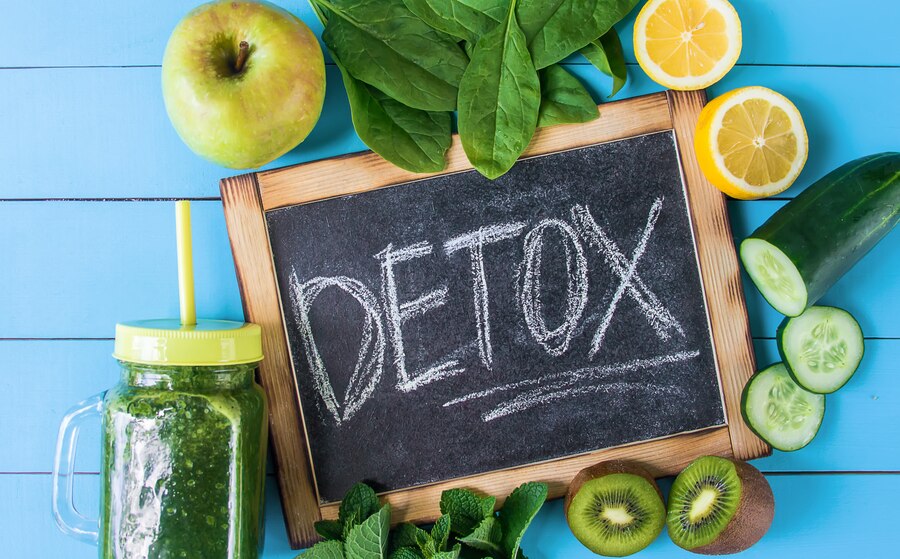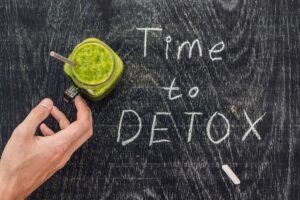In today’s fast-paced world, where processed foods and environmental toxins abound, maintaining optimal health is more challenging than ever. Our bodies are constantly exposed to contaminants from the air we breathe, the water we drink, and the foods we consume. Over time, these toxins can accumulate, leading to a range of health issues including fatigue, weakened immune function, and chronic diseases. This is where the concept of detoxification becomes crucial.
Nutrition plays a pivotal role in detoxification. The foods we eat can either support or hinder our body’s detox capabilities. Consuming nutrient-dense foods rich in antioxidants, fiber, and essential vitamins and minerals can optimize the detox process, enhancing the body’s ability to remove toxins efficiently.
All American Detox is at the forefront of providing comprehensive detox programs that emphasize the crucial role of nutrition. Their evidence-based approach integrates dietary strategies designed to boost the body’s natural detoxification mechanisms. By focusing on high-quality, nutrient-rich foods, All American Detox helps individuals achieve a state of enhanced health and vitality.
In this article, we will delve deeper into the importance of nutrition in detoxification. We will explore the science behind detox, identify key nutrients that facilitate the process, and provide practical tips for implementing a detox-friendly diet. Whether you are looking to embark on a detox journey or simply interested in improving your overall health, understanding the interplay between nutrition and detoxification is essential.
I. Understanding Detoxification
Detoxification is a natural, ongoing process that the body uses to eliminate toxins and maintain optimal health. In recent years, the concept of detox has garnered significant attention, often being marketed through various diets, supplements, and wellness programs. However, understanding the fundamental principles of detoxification is crucial to discerning effective methods from mere fads.
What is Detoxification?
Detoxification refers to the physiological processes through which the body neutralizes and eliminates harmful substances. These substances, or toxins, can be byproducts of normal cellular activity, such as ammonia and lactic acid, or external pollutants like heavy metals, chemicals, and processed food additives. The primary organs involved in detoxification include the liver, kidneys, lungs, skin, and the lymphatic system. Each organ plays a specific role in filtering and excreting toxins, ensuring that the body’s internal environment remains balanced and healthy.
The Role of Nutrition in Detox
Nutrition plays a pivotal role in supporting the body’s detoxification processes. Proper intake of essential nutrients can enhance the efficiency of detoxifying organs, assist in the repair and regeneration of cells, and provide the necessary antioxidants to combat oxidative stress. Key nutrients such as vitamins, minerals, and phytonutrients act as cofactors in enzymatic reactions that facilitate detoxification. For instance, the liver relies on a series of enzyme-driven pathways, known as Phase I and Phase II detoxification, which require specific nutrients to function optimally.
In addition, dietary fiber aids in the elimination of toxins by binding to them in the digestive tract and promoting regular bowel movements. Hydration is equally critical, as water is necessary for kidney function and the excretion of water-soluble toxins through urine. By understanding the significant impact of nutrition on detoxification, individuals can make informed dietary choices that support their body’s natural cleansing mechanisms.
Overview of All American Detox Programs
All American Detox offers a range of programs designed to facilitate effective detoxification through nutritional support. These programs typically integrate scientifically-backed dietary strategies that emphasize whole foods, balanced nutrients, and hydration. By focusing on the inclusion of key detoxifying nutrients and the exclusion of harmful substances, All American Detox aims to enhance the body’s innate ability to cleanse and rejuvenate itself.
Their programs often include personalized meal plans, educational resources, and professional guidance to help individuals achieve their detox goals. Whether it’s through short-term detox diets or ongoing nutritional counseling, All American Detox provides comprehensive solutions to support the body’s detoxification processes and promote overall well-being.
II. Key Nutrients for Effective Detoxification
Detoxification is a natural process that our bodies undergo to eliminate toxins and waste products. Proper nutrition plays a critical role in supporting this process by providing the necessary components that facilitate the removal of harmful substances and promote overall health. Here, we delve into the key nutrients essential for effective detoxification.
Antioxidants
Antioxidants are compounds that help neutralize harmful free radicals in the body, which can cause cellular damage and impede the detoxification process. Several key antioxidants are particularly beneficial for detoxification:
- Vitamins C and E: Known for its immune-boosting properties, vitamin C is also a potent antioxidant that aids in detoxification. It enhances the function of the liver, which is the primary organ involved in detoxification, and helps in the synthesis of glutathione, a critical detoxifying agent. The vitamin E is a fat-soluble antioxidant protects cell membranes from oxidative damage. It works synergistically with vitamin C to reduce oxidative stress and support the detoxification pathways.
- Selenium : Selenium is a trace mineral that plays a vital role in the body’s antioxidant defense system. It is a component of the enzyme glutathione peroxidase, which helps detoxify harmful substances and protect cells from damage.
- Beta-carotene: As a precursor to vitamin A, beta-carotene is another powerful antioxidant. It helps protect the liver from oxidative damage and supports the immune system, ensuring that the body can effectively process and eliminate toxins.
Fiber
Fiber is crucial for detoxification, particularly for its role in promoting healthy digestion and regular bowel movements, which are essential for the elimination of waste products.
- Soluble Fiber: Soluble fiber dissolves in water to form a gel-like substance in the gut. It helps bind toxins and excess cholesterol, facilitating their removal from the body. Sources of soluble fiber include oats, apples, citrus fruits, and legumes.
- Insoluble Fiber: Insoluble fiber adds bulk to the stool and aids in the efficient passage of waste through the digestive tract. This type of fiber is found in whole grains, nuts, seeds, and vegetables.
- Sources of Fiber: A balanced diet that includes a variety of fiber-rich foods is essential for detoxification. Examples include fruits, vegetables, whole grains, legumes, nuts, and seeds. Incorporating these foods into your daily diet helps ensure that your digestive system functions optimally.
Hydration
Proper hydration is fundamental to detoxification, as water is essential for numerous bodily functions, including the elimination of toxins.
- Importance of Water: Water facilitates the transport of nutrients and waste products throughout the body. It also supports kidney function, which is crucial for filtering and excreting toxins. Drinking adequate amounts of water helps maintain the body’s natural detoxification processes.
- Electrolytes Balance: Maintaining a balance of electrolytes, such as sodium, potassium, and magnesium, is important for hydration and overall cellular function. Electrolytes help regulate fluid balance, nerve function, and muscle contractions, all of which are vital during detoxification.
- Herbal Teas and Detox Drinks: Herbal teas and detox drinks can provide additional support for detoxification. Teas made from herbs like dandelion, milk thistle, and green tea have natural detoxifying properties. These beverages can help boost liver function, enhance digestion, and provide antioxidants.
By incorporating these key nutrients—antioxidants, fiber, and hydration—into your diet, you can support your body’s natural detoxification processes and promote better health. In the next section, we will explore practical ways to implement a detox diet, including meal planning, foods to avoid, and the inclusion of superfoods.

III. Implementing a Detox Diet
Planning Your Meals
Embarking on a detox diet requires thoughtful planning to ensure that you are incorporating all the necessary nutrients while avoiding harmful substances. Start by setting clear goals for your detox journey—whether it’s to cleanse your body of toxins, improve digestion, or boost your overall health. Once your objectives are defined, create a meal plan that includes a variety of nutrient-dense foods.
Begin each day with a balanced breakfast that includes a good mix of proteins, healthy fats, and carbohydrates. Opt for smoothies made with leafy greens, berries, and a scoop of protein powder. For lunch and dinner, focus on colorful salads, lean proteins like grilled chicken or fish, and a generous serving of vegetables. Snacks should be wholesome and natural, such as a handful of nuts, fresh fruit, or a small serving of yogurt.
Foods to Avoid
While planning your meals, it’s equally important to identify and eliminate foods that can hinder your detoxification process. Highly processed foods, sugary snacks, and trans fats should be avoided as they can introduce additional toxins into your body. Steer clear of artificial additives, preservatives, and colorings commonly found in packaged foods.
Alcohol and caffeine can also strain your liver, the primary organ responsible for detoxification, so it’s advisable to limit or eliminate these substances during your detox period. Additionally, reduce your intake of refined carbohydrates like white bread, pasta, and sugary cereals, as they can cause blood sugar spikes and inflammation.
Incorporating Superfoods
To maximize the benefits of your detox diet, make sure to incorporate superfoods known for their powerful detoxifying properties. Cruciferous vegetables like broccoli, cauliflower, and Brussels sprouts contain compounds that support liver function and enhance the body’s natural detox pathways. Leafy greens such as spinach, kale, and Swiss chard are rich in chlorophyll, which helps to cleanse the digestive tract and reduce inflammation.
Berries, including blueberries, strawberries, and raspberries, are packed with antioxidants that combat oxidative stress and support overall cellular health. Additionally, herbs and spices like turmeric, ginger, and garlic have anti-inflammatory and antimicrobial properties that can aid in detoxification.
Whole grains like quinoa, brown rice, and oats provide essential fiber to help eliminate toxins through the digestive system. Incorporating a variety of these superfoods into your daily meals can significantly enhance the effectiveness of your detox diet.
By carefully planning your meals, avoiding harmful foods, and incorporating nutrient-rich superfoods, you can effectively implement a detox diet that supports your body’s natural detoxification processes. Remember, the key to a successful detox is consistency and balance, ensuring that you provide your body with the best possible nutrients while eliminating those that can cause harm.
IV. The Nutrition in Detoxification
In conclusion, the integration of proper nutrition into detoxification processes is pivotal for achieving optimal health and wellness. Detoxification is not merely about eliminating toxins from the body; it is about nourishing and supporting the body’s natural systems to function more efficiently. By understanding the mechanics of detoxification and the key nutrients that facilitate this process, individuals can make informed decisions that promote long-term health.
All American Detox programs provide a structured and comprehensive approach to detoxification, emphasizing the importance of nutrition in every step. These programs highlight the necessity of antioxidants, fiber, and hydration, each playing a crucial role in aiding the body’s detox processes. Antioxidants, such as vitamins C and E, selenium, and beta-carotene, help neutralize harmful free radicals. Fiber supports digestive health and aids in the elimination of waste, while proper hydration ensures that the body’s systems function smoothly and efficiently.
Implementing a detox diet requires careful planning and consideration. It is essential to choose nutrient-dense foods, avoid those that hinder detoxification, and incorporate superfoods known for their detoxifying properties. By doing so, individuals can enhance the effectiveness of their detox regimen and support their overall well-being.
Ultimately, the journey to detoxification is not a one-time event but a lifestyle choice. Embracing a balanced diet rich in essential nutrients, staying hydrated, and making mindful food choices can lead to sustained health benefits and a revitalized body. With the guidance and resources provided by All American Detox, individuals are empowered to take control of their health and embark on a path to a cleaner, healthier, and more vibrant life.
FAQs
1. Why is nutrition essential during the detoxification process at All American Detox?
- Nutrition plays a crucial role during detoxification at All American Detox because it provides the body with essential nutrients needed for cellular repair, energy production, and toxin elimination, supporting overall health and wellness.
2. How does nutrition support the body’s natural detoxification mechanisms at All American Detox?
- Nutrition supports the body’s natural detoxification mechanisms at All American Detox by supplying vitamins, minerals, antioxidants, and fiber that help neutralize toxins, enhance liver function, and promote the elimination of waste products from the body.
3. What types of nutrient-rich foods are included in the detoxification meal plans at All American Detox?
- Detoxification meal plans at All American Detox include a variety of nutrient-rich foods such as fruits, vegetables, whole grains, lean proteins, healthy fats, and herbal teas, providing the body with essential nutrients and hydration to support the detox process.
4. How does proper nutrition aid in reducing withdrawal symptoms during detoxification at All American Detox?
- Proper nutrition aids in reducing withdrawal symptoms during detoxification at All American Detox by stabilizing blood sugar levels, replenishing electrolytes, and supporting neurotransmitter balance, helping to alleviate cravings and promote comfort during the withdrawal process.
5. Can nutritional deficiencies impact the detoxification process at All American Detox?
- Yes, nutritional deficiencies can impact the detoxification process at All American Detox by compromising the body’s ability to effectively eliminate toxins and repair damaged tissues. Ensuring adequate nutrient intake is essential for supporting optimal detoxification outcomes.
6. How does All American Detox tailor nutrition plans to meet individual needs during detoxification?
- All American Detox tailors nutrition plans to meet individual needs during detoxification by assessing each client’s nutritional status, health goals, dietary preferences, and medical history, and designing personalized meal plans to support their unique needs and preferences.
7. What role do hydration and fluids play in the detoxification process at All American Detox?
- Hydration and fluids play a vital role in the detoxification process at All American Detox by supporting kidney function, promoting the elimination of toxins through urine, and maintaining overall hydration and electrolyte balance, which is essential for detoxification and overall health.
8. How does All American Detox educate clients about the importance of nutrition in detoxification?
- All American Detox educates clients about the importance of nutrition in detoxification through individual counseling sessions, group workshops, educational materials, and hands-on cooking demonstrations, empowering clients to make informed dietary choices and support their recovery journey.
9. What are some common nutritional goals during the detoxification process at All American Detox?
- Common nutritional goals during the detoxification process at All American Detox include reducing inflammation, supporting liver detoxification pathways, promoting gut health, stabilizing blood sugar levels, and replenishing essential nutrients depleted during substance use.
10. How does All American Detox integrate nutrition into its holistic approach to detoxification and recovery?
- All American Detox integrates nutrition into its holistic approach to detoxification and recovery by recognizing the interconnectedness of nutrition, physical health, mental well-being, and recovery outcomes. By addressing nutritional needs, All American Detox helps clients lay the foundation for long-term health and sobriety.






No comment yet, add your voice below!